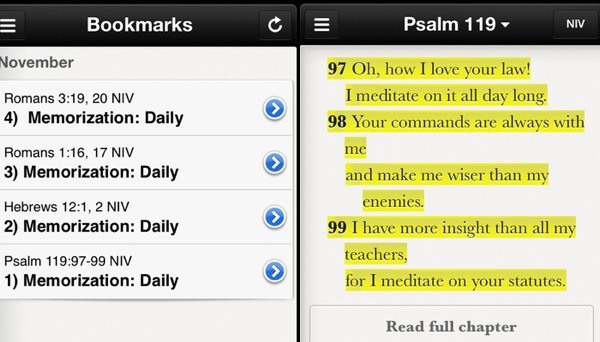 Memorizing scripture can be a daunting and intimidating task. I have oftentimes made well-intentioned efforts to memorize both long and short passages of scriptures, knowing that there is something significant about the discipline of memorizing bible verses. Recently I was introduced to a system for memorizing scripture that still requires discipline, but also will set you up to make scripture memorization a part of your daily devotional life and doesn't take much more than five minutes a day.
Memorizing scripture can be a daunting and intimidating task. I have oftentimes made well-intentioned efforts to memorize both long and short passages of scriptures, knowing that there is something significant about the discipline of memorizing bible verses. Recently I was introduced to a system for memorizing scripture that still requires discipline, but also will set you up to make scripture memorization a part of your daily devotional life and doesn't take much more than five minutes a day.
One blogger wrote, "Practice makes perfect. An accomplished musician may not be able to explain how he can play a particular line of music so well and with such speed. His learning started with slow movements and progressed through repetition, repetition, and more repetition."
If you want to memorize scripture, you need to repeat it often. Repeat it daily; repeat it audibly. And then do it again.
How to Memorize the Bible in Only 5 Minutes a Day
1. Repeat it once daily for 7 weeks. This means that every day you will be saying the scripture you have chosen out loud. The first week you should do this with one verse, the second week add a second, and so on. By the 8th week, you will be always doing 7 verses daily and moving verses out of the daily category and into the weekly category.
2. Repeat it once weekly for 7 months. Once you've repeated a verse out loud for 7 weeks, you should have it pretty well memorized. But you don't want to forget it so repeating it weekly will keep it on your mind. At the end of 7 months (while also still doing other verses weekly and daily) you will move that verse into the monthly category.
3. Repeat it once monthly for 7 years. Okay this seems a bit extreme, but at this point we are just making sure it sticks in our memory forever.
This system can be formatted however you want, and I actually learned this from Paul Arndt who learned from a man named Tom Frost. If you want to see a more detailed what Tom's system looks like on paper, you can check out the charts that he uses to keep track of his memorization schedule. The way that I have begun using this system is by using the Bible app by YouVersion.

How I use the Bible App to help with this process:
1. Highlight and Bookmark. When I find a verse I want to memorize, I make sure to highlight and add it to my bookmarks so I can very quickly find it later.
2. Label appropriately. Once it's highlighted I will created labels like, "1) Daily" so I remember which order I am memorizing them in and how often I need to be practicing each verse.
3. Set reading plan notifications. Having a list of verses to memorize is not helpful if you don't actually remember to do it. I use the Bible app's reading plan notifications to remind me each morning to read the Bible; when the notification comes up I am reminded that I need to practice my memory verses.
“I know of no other single practice in the Christian life more rewarding, practically speaking, than memorizing Scripture. . . . No other single exercise pays greater spiritual dividends! Your prayer life will be strengthened. Your witnessing will be sharper and much more effective. Your attitudes and outlook will begin to change. Your mind will become alert and observant. Your confidence and assurance will be enhanced. Your faith will be solidified.” - Chuck Swindoll





 [This is an excerpt from a
[This is an excerpt from a 

 This week has brought about some interesting news and helpful blog posts that you might find valuable. The crazy Westboro Baptist Church no longer has just Christians and human rights activist as their opposition, but they now also will feel the wrath of One Direction fans. As with any news, the George Zimmerman verdict regarding the death of Trayvon Martin has caused lots of controversy. One of the best posts I've read about this has nothing to do with who's right and who's wrong, but instead with "weeping with those who weep." And lastly I learned that indulgences didn't disappear after Martin Luther, they just aren't sold anymore… they are given away to twitter followers.
This week has brought about some interesting news and helpful blog posts that you might find valuable. The crazy Westboro Baptist Church no longer has just Christians and human rights activist as their opposition, but they now also will feel the wrath of One Direction fans. As with any news, the George Zimmerman verdict regarding the death of Trayvon Martin has caused lots of controversy. One of the best posts I've read about this has nothing to do with who's right and who's wrong, but instead with "weeping with those who weep." And lastly I learned that indulgences didn't disappear after Martin Luther, they just aren't sold anymore… they are given away to twitter followers.  The hardest part of any project is not the beginning or the end of the project, but the middle. Whenever I start a new project, the beginning stages are filled with excitement. My whiteboard gets filled with ideas and possibilities; my conversations are filled with passion as the potential of my new idea is virtually limitless. When I finish a project, there is again great excitement as I get so see a project come to fruition; there is a sense of pride and ownership as a new creation is done. But what about the middle?
The hardest part of any project is not the beginning or the end of the project, but the middle. Whenever I start a new project, the beginning stages are filled with excitement. My whiteboard gets filled with ideas and possibilities; my conversations are filled with passion as the potential of my new idea is virtually limitless. When I finish a project, there is again great excitement as I get so see a project come to fruition; there is a sense of pride and ownership as a new creation is done. But what about the middle?